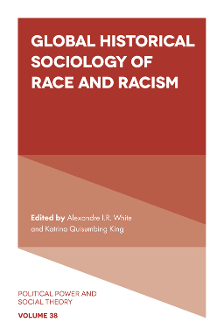
Index
Global Historical Sociology of Race and Racism
ISBN: 978-1-80117-219-6, eISBN: 978-1-80117-218-9
ISSN: 0198-8719
Publication date: 30 September 2021
Citation
(2021), "Index", White, A.I.R. and Quisumbing King, K. (Ed.) Global Historical Sociology of Race and Racism (Political Power and Social Theory, Vol. 38), Emerald Publishing Limited, Leeds, pp. 251-256. https://doi.org/10.1108/S0198-871920210000038012
Publisher
:Emerald Publishing Limited
Copyright © 2021 Alexandre I.R. White and Katrina Quisumbing King. Published under exclusive licence
INDEX
- Prelims
- Introduction: Toward a Global Historical Sociology of Race and Racism
- Empire and Racialization: Reinterpreting Japan's Pan-Asianism from a Du Boisian Perspective
- Race and the Diplomatic Bureaucracy: State-Building in Nineteenth-Century Bolivia as a Response to Transnational Racialization Threats
- Abolition as a Racial Project: Erasures and Racializations on the Borders of British India
- Race, Nation, and Resistance to State Symbolic Power in Rwanda since the 1994 Genocide
- Seeing African and Indigenous States and Societies: Decolonizing and Degrouping Race Scholarships' Narratives of Conquest and Enslavement in the Early Modern Atlantic World
- On the Ecomateriality of Racial-colonial Domination in Rhode Island
- Colonial and Decolonial Resignification: US Empire-state Sovereignty in Hawai‘i
- The Ghost in the Algorithm: Racial Colonial Capitalism and the Digital Age
- Index